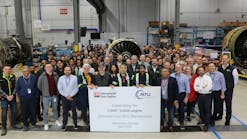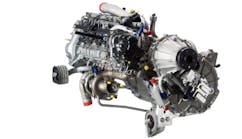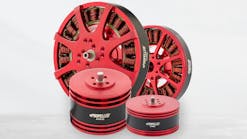Aerospace Lawsuit Targets Collins Aerospace, Second Segment of Raytheon Technologies to Face Claims It Restricted Hiring
A legal challenge against Connecticut’s aerospace industry has broadened to include Collins Aerospace, a Raytheon Technologies Corp. subsidiary accused in a federal lawsuit filed Tuesday of participating in a no-hire agreement that allegedly crippled career and pay opportunities for engineers.
A similar lawsuit in U.S. District Court in December named jet engine manufacturer Pratt & Whitney, another business unit of Waltham, Mass.-based Raytheon, and engineering firms, of taking part in a so-called no-poach arrangement.
The U.S. Department of Justice last month indicted six aerospace industry executives on accusations they agreed to a no-poach agreement. The indictments did not identify the companies for whom the defendants worked.
But in a separate civil lawsuit, a former project worker at an East Hartford engineering company accused Pratt & Whitney and other aerospace businesses of enforcing an agreement not to hire workers in the industry to keep down wages. In addition, a former Pratt & Whitney employee was charged by federal authorities of conspiring with suppliers to restrict the hiring and recruiting of engineers and other skilled workers.
Keller Lenkner, the Chicago law firm that filed the most recent lawsuit, said its challenge is an “expansion of the original complaint against Pratt & Whitney and the suppliers” after its investigation found information to support allegations that Collins Aerospace also was involved in the practices.
A spokesman at Raytheon declined to comment.
Collins Aerospace, a manufacturer of airline components and cockpit and cabin systems, is headquartered in Charlotte, North Carolina. It employs 68,000 workers and operates in Connecticut, including at the former Hamilton Sundstrand site in Windsor Locks.
The no-poach agreement allegedly was made and enforced privately among top aerospace executives, lawyers claim.
“The defendants entered into this... with complete disregard for the impact it would have on their employees, their careers, and their livelihoods,” said attorney Jason Zweig at Keller Lenkner.. “The only concern was for their bottom line and avoiding disruption to their workforce.”
The lawsuit challenges what lawyers claim was an illegal agreement among Pratt & Whitney and Collins and several outsource engineering suppliers to restrict the hiring and recruiting of engineers and other skilled laborers working on aerospace projects.
The no-poach agreement dates to 2011 and continued until at least 2019, according to the lawsuit.
“The scope of the no-poach agreement was broad, covering at least all engineers employed by (or working as an independent contractor for) defendants to work on Pratt & Whitney Collins projects and statements of work in the United States and its territories,” the lawsuit says.
Stephen Singer can be reached at [email protected].
©2022 Hartford Courant. Visit courant.com. Distributed by Tribune Content Agency, LLC.





